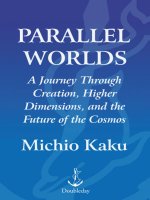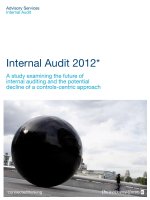- Trang chủ >>
- Khoa Học Tự Nhiên >>
- Vật lý
The future of humanity: a conversation
Bạn đang xem bản rút gọn của tài liệu. Xem và tải ngay bản đầy đủ của tài liệu tại đây (1.41 MB, 103 trang )
THE FUTURE OF HUMANITY
BY j. KRISHNAMURTI
Beyond Violence
Education and the Signi ficance of Life
The Ending of Time (wi th David Bohm)
Exploration into Insight
Firs t and Las t Freedom
The Flame of Attention
The Fligh t of the Eagle
Freedom from the Known
Krishnamurti on Education
Krishnamurti 's Journal
Kri shnamurti 's No tebook
Life Ahead
The Network of Thought
Think On These Things
Truth and Actuality:
Conversations on Science
and Consciousness
The Wholeness of Life
You Are the World
THE FUTURE
OF HUMANITY
A CONVERSATION
J. Krishnam urti
& David Bohm
tfj
1817
Harper & Row, Publishers, San Francisco
Cambrid ge, Hagerstown, New York, Philadelphia
London, Mexico City, Sao Paulo, Singapore, Sydney
Copyright © 1986 by Krish
THE FUTURE OF HUMANITY.
namurti Foundation Trust, Ltd., London. All rights reserved.
Printed in the United States of America. No part of this book
may be used or reproduced in any manner whatsoever with
out written permission except in the case of brief quotations
embodied in critical articles and reviews. For information
address Harper & Row, Publishers, Inc., io East 53rd Street,
New York, NY 10022. Published simultaneously in Canada by
Fitzhenry & Whiteside, Limited, Toronto.
FIRST EDITION
Library of Congress Cataloging-in-Publication Data
Krishnamurti, J. (Jiddu), 1895The future of humanity.
"Prepared from dialogues that took place . .. at
Brockwood Park, England, on June 11 and 20, 1983"-P.
1. Man.
I. Bohm, David.
B5134.K753F87 1986
ISBN 0-06-o64 797-3
86
87
88
89
go
II. Title.
85-45740
128
HC
io
9
8
7
6
5
4
3
2
i
This book has been prepared from
Dialogues that look place between
J. Krishnamurli and Professor David Bohm
al Brockwood Park, England,
on June 1 1 and 20, 1 983.
CONTENTS
Preface
ONE
TWO
1
I
I
June 11, 1983
June20, 1983
5
53
PREFACE
The two dialogues which appear in this book took place
three years after a series of thirteen similar dialogues
between Kri shnamurti and myself, which appeared in
the book "The Ending of Time. "* Therefore they were
inevitably profoundly affected by what had been done
in these earlier dialogues. In a certain sense, therefore,
the two books deal with closely related ques tions . Of
cours e, "The Ending of Time" can, because of its much
greater length, go into these questions in a more thor
ough and extensive way. Nevertheless, the present
book stands by itself; it approaches the problems of hu
man life in its own way, and provides important addi
tional insights into these problems . Moreover, I feel
that it is an easier book to follow, and may therefore
usefully s erve as an introduction to "The Ending of
Time. "
The starting point for our discuss ions was the ques
tion : "What is the future of humanity?" This question is
by now of vital concern to everyone, because modern
science and technology are clearly seen to have opened
up immense pos sibilities of des truction. It soon became
clear as we talked together that the ultimate ori gin of this
*Harper & Row, 1985.
situation is in the generally confused mentality of man
kind, which has not changed basically in this respect
throughout the whole of recorded history and probably
for much longer than this. Evidently, it was essential to
inquire deeply into the root of this difficulty if there is
ever to be a possibility that humanity will be diverted
from its present very dangerous course.
These dialogues constitute a serious inquiry into this
problem, and as they proceeded, many of the basic
points of Krishnamurti's teachings emerged. Thus, the
question of the future of humanity seems, at first sight,
to imply that a solution must involve time in a funda
mental way. Yet, as Krishnamurti points out, psycholog
ical time, or "becoming," is the very source of the de
structive current that is putting the future of humanity
at risk. To question time in this way, however, is to
question the adequacy of knowledge and thought, as a
means of dealing with this problem. But if knowledge
and thought are not adequate, what is it that is actually
required? This led in turn to the question of whether
mind is limited by the brain of mankind, with all the
knowledge that it has accumulated over the ages. This
knowledge, which now conditions us deeply, has pro
duced what is, in effect, an irrational and self-destruc
tive program in which the brain seems to be helplessly
caught up.
If mind is limited by such a state of the brain, then the
future of humanity must be very grim indeed. Krish
namurti does not, however, regard these limitations as
inevitable. Rather, he emphasizes that mind is essentially
free of the distorting bias that is inherent in the condi2
tioning of the brain, and that through insight arising in
proper undirected attention wi thout a center, it can
chan ge the cells of the brain and remove the destructive
conditioning. If this is so, then it is crucially importan t
that there be this kind of attention, and that we give to
this ques tion the same intensity of energy that we gener
ally give to other activities of life that are really of vi tal
interes t to us.
At this point, it is worth remarking that m odern re
search into the brain and nervous sys tem actually gives
co nsiderable support to Krishnamurti's statemen t that
insigh t may change the brain cells . Thu s , for example, it
is now well known that there are important substances in
the body, the hormones and the neurotransmitters , that
fundamen tally affect the en tire functioning of the brain
and nervous sys tem . These substances respond, from
moment to moment, to what a person knows, to what he
thinks , and to what all this means to him. It is by now
fairly well es tablis hed that in this way the brain cells and
their functioning are profoundly affected by knowledge
and thought, es pecially when these give rise to strong
feelings and passions . It is thus quite plausible that in
sight, which mus t arise in a s tate of great mental energy
and passion, could change the brain cells in an even more
profound way.
What has been said here necessarily gives only a brief
outline of what is in the dialogues, and cannot show the
full scope and depth of the inquiry that takes place within
them into the nature of human consciousness and of the
pro blem s that have arisen in this consciousnes s . Indeed ,
I would say that the result has been a concise and easily
3
readable book, which contains the essential spirit of the
whole of Krishnamurti's teachings, and throws an impor
tant further light on them.
David Bohm
4
ONE
There are several problems that we
might discu s s . One is , when a person is jus t s tarting out
he has to make a living. There are very few opportunities
now, and most of these are in jobs which are extremely
limited.
DAVID BOHM:
J. KRISHNAMURTI:
And there I S unemployment
throughou t the world. I wonder what he would do, know
ing that the future is grim, very depressing, dangerous ,
and s o uncertain. Where would you begin?
DB:
Well I think one would have to s tand back from
all the particular problems of one's own needs and the
needs of people around one.
Are you saying one should really forget oneself for
the time being?
JK:
DB:
Yes .
JK:
Even if I did forget myself, when I look at this
world in which I am going to live , and have some kind of
career or profession, what would I do? This is a problem
that I think most young people are facing.
Yes . That's clear. Well, have you something that
you would sugges t ?
DB:
5
JK:
You see I don ' t think in terms of evo lution.
DB :
I unders tand that. That's the point I was expecting we would discuss .
JK:
I don ' t think there is psychological evolu tion at all.
We have discu ssed this quite often so I think I
DB:
understand to some extent what you mean . But I think
that people who are new to this are not going to under
stand.
JK:
Yes, we will discuss this who le ques tion, i f you will .
Why are we concerned about the future? Surely the
whole future is now.
DB:
In a sense the whole future is now, but we have
to make that clear. It goes very much agains t the whole
way of thinking, of the tradition of mankind ... .
JK:
I know. Mankind thinks in terms of evolution , continuance, and so on.
DB :
Perhaps we could approach it in an other way?
That i s , evolution seems in the present era to be the mos t
natural way to think. S o I would like to ask you what
objectio ns you have to thinking in terms of evolution.
Could I explain a point? This word evolution has many
meanmgs.
JK:
DB :
JK:
Of course. We are talking psycholo gically.
Now the first point i s , let ' s dispose of it physically.
An acorn will grow into an oak.
6
Also the species have evolved: for example, from
the plants to the animals and to man .
DB:
JK:
are .
Yes , we have taken a million years to be what we
DB:
You have no question that that has happened ?
JK:
DB:
JK:
DB:
JK:
No, that has happened .
It may continue to happen.
That is evolution .
That is a valid process .
O f course.
It takes place in time. And , therefore, in that re
gion the past, present, and future are important.
DB:
Yes obviously. I don't know a certain language, I
JK:
need time to learn it.
Also it takes time to improve the brain. You see,
if the brain s tarted out small, and then it got bigger and
bigger, that took a million years .
DB:
And it becomes much more complex, and so on.
JK:
All that needs time. All that is movement in space and
time.
Yes. So you will admit physical time and neurophysiological time.
DB:
JK:
Neuro-physiological time, absolu tely. Of course .
Any sane man would .
7
DB:
Now most people also admit psychological time,
what they call mental time.
JK:
Yes , that is what we are talking about. Whether
there is such a thing as psychological tomorrow, psycho
logical evolution.
DB:
Or yes terday. Now at first sight I am afraid this
will sound strange. I t seems I can remember yes terday .
And there is tomorrow; I can anticipate. And it has hap
pened many times , you know days have succeeded each
other. So I do have the experience of time, from yes ter
day to today to tomorrow.
JK:
DB:
JK:
Of cours e. That is simple enough.
Now what is it that you are denying?
I deny that I will be something, become better.
DB:
I can change . . . but now there are two ways of
looking at that . One approach is, will I intentionally be
come better because I am trying? Or is evolution a natu
ral, inevitable process , in which we are being swept along
as if in a current, and perhaps becoming better, or worse,
or finding that something is happening to us.
JK:
Psychologically.
Psychologically, which takes time, which may not
DB:
be the result of my trying to become better. I t may or may
not be. Some people think one way, some ano ther. But
are you denying also that there is a kind of natural psy
chological evolution as there was a natural biological
evolution?
8
JK:
DB:
I
am denying that, yes .
Now why do you deny it?
Because, first of all , what is the psyche, the me, the
J K:
ego , and so o n ? What is it ?
DB:
The word psyche has many meanings . It may
mean the mind, for example. Do you mean that the ego
is the same thing?
JK:
The ego . I am talking of the ego, the me.
DB:
Yes . Now some people think there will be an evolu tion in which the me is transcended, that it will rise to
a higher level .
JK:
Yes , will the trans ition need time?
DB:
A transcendence, a transition.
JK:
Yes. That is my whole question .
So there are two ques tions: one is, will the me
DB:
ever improve ? And the other is, even if we suppose
we want to get beyond the me, can that be done in
time ?
JK :
DB:
That cannot be done in time.
Now we have to make it clear why not .
Yes . I will. We will go into i t. What is the me? If
JK:
the psyche has such different meanings, the me is the
whole movemen t which thought has brought about.
DB:
Why do you say that ?
9
JK:
The me is the consciousnes s , my consciousnes s :
the me i s my name, form, and all the experiences,
remembrances , and so on that I have had . The whole
s tructure of the me is put together by thought.
DB:
That again would be s omet hing which some people might find i t hard to accept.
JK:
Of course. We are discussing it.
DB:
Now the firs t experience , the firs t feeling I have
about the me i s that it is there independently and that the
me is thinking.
JK:
Is the me independent of my thinki ng?
Wel l my own firs t feeling is that the me is there
DB:
independent of my thinking. And that it is the me that is
thinking, you see.
JK:
Yes .
DB: Just as I am here, and I could move; I could move
my arm, I could think, or I could move my head . Now is
that an illusion ?
JK:
DB:
No .
Why?
Because when I move my arm there is the inten
JK:
tion to grasp s omething, to take something, which is firs t
the movement of thought. That makes the arm move,
and so on. My contention is-and I am ready to accept
it as false or true-that though t is the basis of all this .
IO
D B:
Yes. You r co ntention is that the whole sense of
the me and what it is doing is coming out of thought.
Now what you mean by thought is not merely intellec
tual ?
J K:
No, of course not. Though t is the movement of
experience, knowledge, and memory . I t is this whole
movement.
D B:
It sounds to me as if you mean the consciousness
as a whole.
JK:
D B:
As a whole, that's righ t.
And yo u are saying that that movement is the me ?
JK:
The whole content of that consciousness is the me .
That me is not different from my consciousness.
DB:
Yes. I think one could say that I am my consciousness, for if I am not conscious I am not here.
JK:
Of course .
DB:
Now is consciousness nothing but what you have
just described , which includes thought, feeling, intent1on ";>. . . .
•
JK:
DB:
. . . intention, aspirations .
. . . memories . . .
J K:
. . . memories, beliefs, dogmas, the rituals that are
performed . The whole, like the computer that has been
programmed .
I I
DB:
Yes . Now that certainly is in consciousness . Ev
erybody would agree, but many people would feel that
there is more to it than that; that consciousness may go
beyond that.
JK:
Let's go into it. The content of our cons ciousness
makes up the consciousnes s .
DB:
Yes , I think that requires some understanding.
The ordinary use of the word content is quite different.
If you sa y that th e conten t of a glass is water, the glass
is one thing and the water is another.
JK:
Consciousness is made up of all that it has remem
bered: beliefs , dogmas, rituals , fears , pleasures , sorrow.
Yes . Now if all that were absent, would there be
DB:
no consciousness ?
JK:
DB:
Not as we know it .
But there would s till be a kind of consciousness ?
A totally different kind. But conscious nes s , as we
JK:
know it, is all that .
DB:
A s w e generally know i t .
Yes . And that is the result of multiple activities of
JK:
thought. Thought has pu t all this together, which is my
consciousness-the reactions, the responses , the memo
ries-extraordinary, complex intricacies and subtleties .
All that makes up conscious nes s .
DB:
As we know it.
12
JK:
But does that consciousness have a future ?
DB:
Yes. Does it have a past?
JK:
Of course . Remembrance.
Remembrance, yes. Why do you say it has no
DB:
future then?
I f it has a fu ture it will be exactly the same kind of
JK:
thing, moving. The same activi ties, the same thoughts,
modified , but the pattern will be repeated over and over
agam.
DB:
JK:
Are you saying that thought can only repeat?
Yes.
But there is a feeling, for example, that thought
DB:
can develop new ideas.
JK:
Bu t thou ght is limited because knowledge is limited .
DB:
JK:
D B:
Well, yes, that might require some discussion .
Yes, we must discuss it.
Why do you say knowledge is always limited?
JK:
Because you, as a scientist, are experimenting,
adding, searching. And after you some other person will
add more . So knowledge, which is born of experience, is
limited .
DB:
But some people have said it isn't. They would
hope to obtain perfect, or absolute, knowledge of the
laws of nature.
JK:
The laws of nature are not the laws of human
beings.
DB:
Well, do you want to restrict the discussion then
to knowledge about the human being?
JK:
Of course, that's all we can talk about.
DB:
Even there, it is a question of whether that knowledge of nature is possible too .
JK:
Yes. We are talking about the fu ture of humanity.
DB:
So are we saying that man cannot obtain unlimited knowled ge of the psyche ?
JK:
DB:
That's right.
There is always more that is unknown.
JK:
Yes. There is always more and more unknown. So
if once we admit that knowledge is limited, then though t
is limited.
DB:
Yes, though t depends on knowledge , and the
knowledge does not cover everything. Therefore
thought will not be able to handle everything that hap
pens.
JK:
That's right. Bu t that is what the politicians and all
the other people are doing. They think thought can solve
every problem .
DB:
Yes. You can see in the case of politicians that
knowledge is very limited , in fact it is almos t nonexistent !
And , therefore, when you lack adequate knowledge of
what you are dealing with, you create confusion .
Yes . S o then as thought is limited, our cons cious
J K:
nes s , which has been put together by thought , is limited .
DB:
Now can you make that clear? That means we can
only stay in the same circle.
J K:
The same circle.
You see, one of the ideas might be , if you comDB:
pare with science, that p eople might think although their
knowledge is limited they are cons tantly discovering.
J K:
What you discover is added to, bu t is still limited .
DB:
I t is s till limited . That's the point. I can keep on;
I think one of the ideas behind a scientific approach is
that, though knowledge is limited, I can discover and
keep up with the actuality.
J K:
But that is also limited .
My discoveries are limited . And there is always
DB :
the unknown which I have not discovered.
That is what I am saying. The unknown, the limitJ K:
les s , cannot be captured by thought .
DB:
Yes .
Becaus e thought in itself is limited . You and I
J K:
agree to that; we not only agree but it is a fact.
DB :
Perhap s w e could bring it out still more. That is,
thought is limited, even though we might intellectually
consider that thought is not limited . There is a very
strong predisposition, tendency, to feel that way-that
thought can do anything.
Anything. It can' t . See wha t it has done
JK:
world .
m
the
Well, I agree that it has done some terrible things ,
DB:
but that doesn' t prove that it is always wrong . You see,
perhaps you could blame it on the people who have used
it wrongly.
I know, that is a good old trick! But thought in
JK:
itself is limited, therefore whatever it does is limited .
Yes, and you are saying that it is limi ted in a very
DB:
senous way.
JK:
way.
DB:
JK:
DB:
That 's right . Of course
m
a very , very senous
Could we bring that out ? Say what tha t way is ?
That way is what is happening in the world.
All right, let 's look at that .
The totalitarian ideals are the invention of
JK:
thought.
The very word totalitarian means that people
D B:
wanted to cover the totality, but they couldn' t.
JK:
They couldn't.
DB:
The thing collapsed .
JK:
I t is collapsing.









